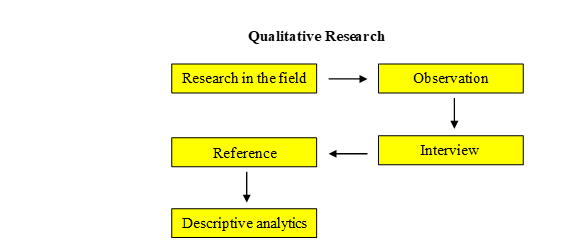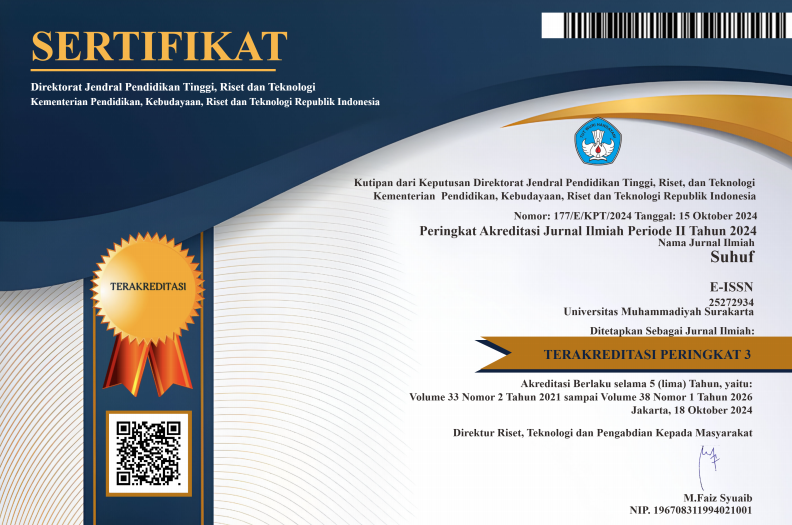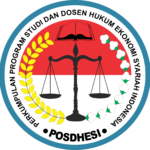Teacher Competency in Applying Assessment for Islamic Education Learning in the Digitalisation
DOI:
https://doi.org/10.23917/suhuf.v37i1.8644Keywords:
Learning assessment, Islamic religiuos education, Teacher competence, Digitalisation of education, Computer-based testAbstract
The era of digitalisation has transformed the learning assessment process, especially in Islamic Religious Education (PAI). Teachers’ competence in carrying out assessments integrating digital technology with Islamic values is a determining factor in the effectiveness of learning evaluation. This study aims to analyse teachers' competence in conducting Islamic Education learning assessments, identify effective assessment criteria, and examine the implementation of Islamic Education assessments in the digital era. This research uses a descriptive qualitative approach with a phenomenological method, using data collection techniques through interviews, observation and documentation at SMP Muhammadiyah PK Kotabarat Surakarta. PAI teachers’ competence in assessment still needs continuous strengthening. The implementation of Computer-Based Tests (CBT) for PAI shows a significant transformation in the evaluation process, although it still faces technical and pedagogical challenges. The school implemented a comprehensive strategy to address teachers' competency gaps through periodic evaluations, deliberation forums, and continuous training. Developing teachers’ competencies in PAI assessment in the digital era requires the integration of pedagogical, technological and analytical skills supported by continuous professional development programs.
Downloads
References
[1] E. Manik, S. Nasution, and S. T. Sumanti, “Analisis Kompetensi Pedagogik Guru Pada Proses Pembelajaran [An Analysis of Teachers’ Pedagogical Competence in the Teaching and Learning Process],” Munaddhomah J. Manaj. Pendidik. Islam, vol. 4, no. 3, pp. 659–668, (in Indonesia), 2023, doi: https://doi.org/10.31538/munaddhomah.v4i3.464.
[2] S. Santosa and M. F. Jazuli, “The digital Madrasah as an idea of IT-Based Islamic education,” Nazhruna J. Pendidik. Islam, vol. 5, no. 2, pp. 379–391, 2022, doi: https://doi.org/10.31538/nzh.v5i2.2121.
[3] M. Arif, M. K. N. Abd Aziz, and M. A. Ma’arif, “A recent study on islamic religious education teachers’ competencies in the digital age: A systematic literature review,” J. Educ. Learn., vol. 19, no. 2, pp. 587–596, 2025, doi: https://doi.org/10.11591/edulearn.v19i2.21311.
[4] F. N. Anggraini, T. A. Mustofa, and A. F. M. Q. Al Hadi, “Islamic Religious Education Learning Strategies for Inclusion Students at Muhammadiyah High School,” Intelekt. J. Pendidik. dan Stud. Keislam., vol. 14, no. 3, pp. 433–448, 2024, doi: https://doi.org/10.33367/ji.v14i3.6194.
[5] D. Dahlan, L. Permana, and M. Oktariani, “Teacher’s competence and difficulties in constructing hots instruments in economics subject,” Cakrawala Pendidik., vol. 39, no. 1, pp. 111–119, 2020, doi: https://doi.org/10.21831/cp.v39i1.28869.
[6] D. D. A. B. Kaban, T. S. B. Sembiring, N. Hasibuan, and S. Syahrial, “Pengaruh Mata Kuliah Metodologi Penelitian terhadap Karya Tulis Ilmiah Mahasiswa PGSD Stambuk 2022 Universitas Negeri Medan [The Impact of Research Methodology Course on Scientific Writing of PGSD Students, Class of 2022, University of Negeri Medan],” Edukasi Elit. J. Inov. Pendidik., vol. 2, no. 2, pp. 173–184, (in Indonesia), 2025, doi: https://doi.org/10.62383/edukasi.v2i2.1422.
[7] M. Thohir, S. Maarif, J. Rosyid, H. Huda, and A. Ahmadi, “From Disruption to Mobilization: Ire Teachers’ Perspectives on Independent Learning Policy,” Cakrawala Pendidik., vol. 40, no. 2, pp. 359–373, 2021, doi: https://doi.org/10.21831/cp.v40i2.39540.
[8] M. S. Djazilan and M. Hariani, “Implementation of E-Learning-Based Islamic Religious Education,” Bull. Sci. Technol. Soc., vol. 1, no. 2, pp. 14–21, 2022, [Online]. Available: https://inti.ejournalmeta.com/index.php/inti/article/view/12
[9] Q. Y. Zaqiah, A. Hasanah, Y. Heryati, and R. Rohmatulloh, “The Impact of In-Service Teacher Education Program on Competency Improvement Among Islamic Religious Education Teachers Using Self-Assessment,” Educ. Sci., vol. 14, no. 11, p. 1257, 2024, doi: https://doi.org/10.3390/educsci14111257.
[10] H. Taufik and M. Rusdi, “Teachers Challenges and Strategies in Facing the Digitalization Era in Islamic Education in Madrasahs in West Java Region,” West Sci. Islam. Stud., vol. 2, no. 04, pp. 184–190, 2024, [Online]. Available: https://wsj.westscience-press.com/index.php/wsiss
[11] S. S. Eraku, M. K. Baruadi, S. P. D. Anantadjaya, S. Fadjarajani, U. Supriatna, and A. Arifin, “Digital literacy and educators of Islamic education,” Edukasi Islam. J. Pendidik. Islam, vol. 10, no. 01, pp. 569–576, 2021, doi: https://doi.org/10.30868/ei.v10i01.1533.
[12] N. A. Azman, M. I. Hamzah, and H. Baharudin, “Digital Teaching Strategies of Islamic Education Teachers: A Case Study in Primary Schools,” Int. J. Learn. Teach. Educ. Res., vol. 24, no. 3, pp. 562–585, 2025, doi: https://doi.org/10.26803/ijlter.24.3.27.
[13] N. Millatina, “Discourse On Learning Media In The Digitalization Era And Its Implications For Students Higher Order Thinking Skills (Hots) In Islamic Education Subjects,” in Proceeding International Conference on Islam and Education (ICONIE), 2024, pp. 2387–2405. [Online]. Available: https://proceeding.uingusdur.ac.id/index.php/iconie/article/view/2077
[14] M. H. Wadi, R. Malli, and M. Asykur, “Digital Age Education Management Strategies in Facing Global Changes in Islamic Education,” Bus. Appl. Manag. J., vol. 1, no. 1, pp. 23–36, 2023, doi: https://doi.org/10.61987/bamj.v1i1.355.
[15] M. A. Wicagsono and B. M. A. M. H. Al, “Strategies for Improving Teacher Pedagogic Competence Industrial Revolution Era 4.0,” Multicult. Islam. Educ. Rev., vol. 1, no. 1, pp. 15–25, 2023, doi: https://doi.org/10.23917/mier.v1i1.2816.
[16] W. Mas’ ula and A. M. Hakim, “Islamic Education in the Era of Digitalization 5.0,” in Proceeding Of International Conference on Education, Society And Humanity, 2023, pp. 35–40. [Online]. Available: https://ejournal.unuja.ac.id/index.php/icesh/article/view/5585
[17] A. Alarfaj and M. Alrashidi, “Revolutionizing gifted education: enhancing teachers’ digital competence through fourth industrial revolution training,” Discov. Sustain., vol. 6, no. 1, p. 159, 2025, doi: https://doi.org/10.1007/s43621-025-00946-y.
[18] C. Nikmatullah, W. Wahyudin, N. Tarihoran, and A. Fauzi, “Digital Pesantren: Revitalization of the Islamic Education System in the Disruptive Era,” Al-Izzah J. Hasil-Hasil Penelit., vol. 18, no. 1, pp. 1–14, 2023, doi: https://doi.org/10.31332/ai.v0i0.5880.
[19] S. Siskandar, “The role of religious education and utilization digital technology for improving the quality in sustainability madrasa,” J. Tarb., vol. 27, no. 1, 2020, [Online]. Available: http://jurnaltarbiyah.uinsu.ac.id/index.php/tarbiyah
[20] B. Santoso, M. Triono, M. A. A. Shiddiq, and S. Arifin, “The Readiness of Islamic Religious Education Teachers to Enter The Era of Industrial Society 5.0,” Tafkir Interdiscip. J. Islam. Educ., vol. 5, no. 4, pp. 624–636, 2024, doi: https://doi.org/10.31538/tijie.v5i4.1183.
[21] M. W. Shohib, M. Z. Azani, N. L. Inayati, D. Dartim, and A. Nubail, “Islamic Perspective on Organizational Citizenship Behavior Among Academic Staff in Indonesian State Islamic Higher Education: Is It Effective?,” Suhuf Int. J. Islam. Stud., vol. 36, no. 2, pp. 155–169, 2024, doi: https://doi.org/10.23917/suhuf.v36i2.4702.
[22] D. F. Isma and V. Duran, “Improving the Professional Competence of Primary Madrasah Teachers in Responding to the Challenges of 21st Century Islamic Education,” Soc. Crit. Islam. Stud., vol. 1, no. 1, pp. 69–83, 2024, doi: https://doi.org/10.35723/scis.v1i1.9.
[23] M. A. Lubis, R. Mustapha, S. T. Abdul Rahman, M. M. Ikwan Lubis SE, and M. S. Kamis, “A review of teaching islamic education in a new digital age,” ASEAN Comp. Educ. Res. J. Islam Civiliz. (ACER-J). eISSN2600-769X, vol. 2, no. 2, pp. 92–100, 2019, [Online]. Available: https://spaj.ukm.my/acerj/index.php/acer-j/article/view/45
[24] R. Rifah, M. Jailani, and M. Huda, “Artificial Intelligence (AI): An Opportunity and Challenge for Achieving Success in Islamic Education in the Era of Digital Transformation,” Suhuf Int. J. Islam. Stud., vol. 36, no. 2 SE-Articles, Nov. 2024, doi: https://doi.org/10.23917/suhuf.v36i2.6273.

Downloads
Submitted
Accepted
Published
How to Cite
Issue
Section
License
Copyright (c) 2025 Eka Nur Mistiawati , Nurul Latifatul Inayati, Mohamed Iyas Valarthodi , I Irshad

This work is licensed under a Creative Commons Attribution 4.0 International License.


















